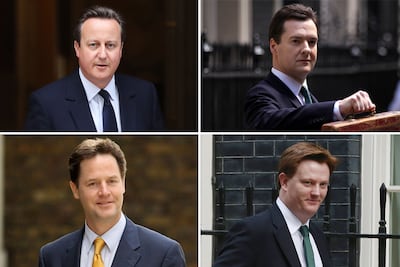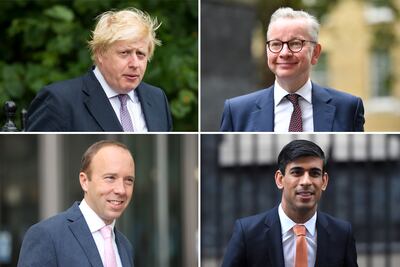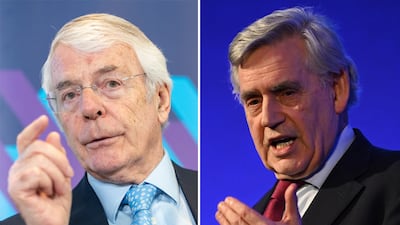The UK needs a “turnaround strategy” for the economy, which should be put on a "war footing" to stimulate growth, former prime minister Gordon Brown has said.
Sharing a platform with another former prime minister John Major to call for government reform, Mr Brown urged the Treasury to escape from its “comfort zone” and help the UK break out of a low-growth cycle.
Mr Brown told a gathering at the Institute for Government (IfG) think tank that the UK's productivity growth rate is "lower than at any time since the Industrial Revolution". Those in government need to "think with almost military precision about how we can put our economy on a war footing so that we are in a position to solve the problems", he said.
"Investment in this country is far lower as a percentage of national income than almost all our major competitors," he added.
"We cannot govern in the way we've been doing if we are going to make this a decade when we can see an economic recovery."
Mr Brown argued that for that recovery to happen, the Treasury must be more than a finance department focused solely on balancing the books and reducing national debt.
"If it really restricts itself to being a finance department, then to me there is not much hope for the Treasury to be able to contribute to the economic agenda in the way it should.
"But if the Treasury was working as an economic department ... we have a chance to break out of some of the difficulties that we've had in the past."

'Power is safest when it is spread around'
Mr Brown was speaking as the IfG released its report entitled Power with Purpose, which called for sweeping reforms at the centre of government, claiming "the UK is a highly centralised country with a weak centre".
Calling for the decentralisation of power, Mr Major said: "In a democracy, power is safest when it is spread around and if we fail to delegate, we waste rich resources of manpower and experience in every part of our political and administrative system."
The final report of the IfG's Commission on the Centre of Government said three main institutions – No 10 Downing Street, the Cabinet Office and the Treasury – were not up to the modern challenges faced by the UK, and a small, select group of senior ministers should make the big political decisions before they are adopted by the full cabinet.
The report, which has taken a year to compile, said No 10 was seriously "underpowered" and becomes too easily bogged down in detail and micro-management, while the Cabinet Office has "lost its focus" and the power of the Treasury means it "distorts decision-making in a way that ripples out across government".
While agreeing reform was needed, Mr Major noted the UK was "not a presidency".
"I do not wish to see an increase in the power of No 10," he said. "Constitutionally, the prime minister has few powers; in practice he or she has many simply because of the position they hold.
"With a large [political] majority, a prime minister can be almost unconstrained in his or her actions – you see that in many pseudo-democracies.
"My preference is quite clear. I prefer effective cabinet government to prime ministerial dictate."
The structure of government in the UK has been largely unchanged since the 18th century, when the practice of having a prime minister in charge of a large and widespread cabinet comprised of ministers who head individual departments was developed. The enacting of government policy within those departments is then carried out by the civil service, the head of which is also cabinet secretary.
Quadrumvirates

The report goes on to say there is a "strategic vacuum at the heart of government", because a prime minister's ideas often do not become translated in outcomes, while governments are too prone to "strategic ambiguity" that in the end restricts their "ability to deliver their priorities and manifesto promises".
The IfG did, however, offer seven proposals to solve the problems it sees at the centre of the UK government, which included the creation of an executive cabinet committee made up of a few key ministers.
There are currently 32 cabinet ministers, which the IfG argues is too many and that government would be more effective if a smaller committee could make budget and spending decisions as well as dictate fiscal policy, which would then be approved by the broader cabinet.
While Mr Major agreed a bloated cabinet was undesirable, he was sceptical about having a few ministers making the important strategic decisions.
"Ideally, the full cabinet should be better focused and significantly trimmed in size itself," he said.
"But there are practical drawbacks to a formal 'inner cabinet'. It would alienate those who were excluded.
"It would change the collegiate nature of the wider cabinet and diminish the perception for it, and it would make reshuffles an absolute nightmare for prime ministers – and I assure you, they are difficult enough without that added problem."
Mr Brown said he would be "shocked and surprised" by any suggestion that an inner cabinet of four could work.

"Triumvirates have always been difficult in the first place but to have a quadrumvirate is very difficult.
"The historical experience of that is pretty inauspicious. King Herod was part of a quadrumvirate and you can take it through to recent times with the Gang of Four which, if I remember right, has not survived to tell much of the tale."
The Gang of Four in British politics emerged in 1981, comprised of senior Labour party politicians Roy Jenkins, David Owen, Bill Rodgers and Shirley Williams, who broke away to form the Social Democratic Party. The SDP was dissolved seven years later.
There have been other more recent quadrumvirates. During the Conservative-Liberal coalition government of 2010-2015, key decisions were made by a core group called the Quad, made up of David Cameron (prime minister), Nick Clegg (deputy prime minister), George Osborne (chancellor of the exchequer) and Danny Alexander (chief secretary to the Treasury).
During the Covid pandemic, the then-Conservative prime minister Boris Johnson had an inner-circle quadrumvirate that included Michael Gove (cabinet secretary), Matt Hancock (health secretary) and Rishi Sunak, who at the time was chancellor.


